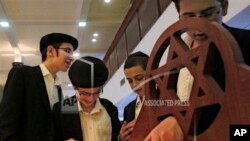In theory, every Russian citizen has the right to “profess, individually or jointly with others, any religion, or to profess no religion.” He or she may also “freely choose, possess, and disseminate religious or other beliefs, and to act in conformity with them.”
These rights are guaranteed by the Russian Constitution, which also forbids discrimination or abridgement of the rights of citizens on religious grounds.
Yet by law, officials may prohibit the activity of a religious association for violating public order or engaging in “extremist activity.” Russian law on religion defines Christianity, Islam, Judaism, and Buddhism as the country’s four traditional religions and but also grants special status to the Russian Orthodox Church.
According to the U.S. State Department’s recently-issued 2014 Religious Freedom Report, in accordance with the law, government-approved religious groups, and other established Judeo-Christian religious groups, were mostly left in peace by authorities.
That was not the case with minority religious groups, which are required to register with the government, an onerous and expensive process. With the creative use of vaguely-worded laws on extremism and incitement to violence, government entities harassed, fined and prosecuted members of minority religions, even going so far as to confiscate their religious literature.
Indeed, laws against extremism have been used to revoke the registration of minority religious groups, to refuse to register certain religious organizations, and to impose restrictions that infringe on the practices of minority religious groups. Such restrictions have hobbled their ability to purchase land and build places of worship.
Although Judaism is specifically named as one of Russia’s traditional religions, anti-Semitic rhetoric on the part of politicians and government officials, as well as increased anti-Semitic statements in government-controlled media, have risen steadily over the past year. Vandalism of synagogues, cemeteries, and mosques increased.
The United States urges the Russian government to afford all citizens the right to worship as they see fit, as stated in the Russian Constitution.
“The right to religious freedom is not contingent on having a large number of followers,” said Secretary of State John Kerry.
“Religious minorities – including those who profess no faith – should have the same rights as religious majorities, and that is a fundamental belief.”






